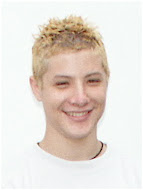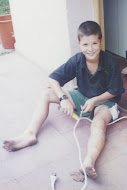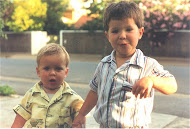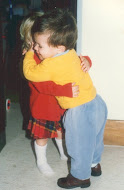Thursday, July 15, 2010
"Don't forget the family"
Tim recently had this article published in the British Medical Journal.
I stood beside the bed in silence. Emotional confusion overpowered the
urge to speak. The room was silent except for the drone of the
ventilator and the clicking of the drug pumps. "Take all the time you
need. Let us know when you're ready," the intensivist said. Two hours
later we were "ready"—as ready as we were ever going to be. The doctor
came into the crowded room and turned off the ventilator. He twisted
the monitor around so that we couldn't see it. He walked out silently.
A long 10 minutes would be an understatement. Ben struggled to
breathe, fluid rattling in his lungs. And then he breathed his last.
Six months earlier my 23 year old brother was fit and healthy and was
completing his science degree to progress on to medicine. Natural
killer cell lymphoma wasn't even looming on the horizon; the only hint
of it was a small pea-sized lump on his leg.
It is inconceivable to articulate the emotional strain of having a
terminally ill brother. But what I can express is the significance of
a positive interaction between the doctors and the family of someone
who is chronically unwell. The interest and time that a doctor invests
in "the family" will not have a direct effect on the medical outcome.
But it will affect the journey for the patient and the family.
Doctors need to be skilled in juggling. To possess competent medical
and surgical skills is not enough. They also have to manage emotions
and concerns. Although the patient is the clinician's primary concern,
I think that doctors also have a duty to those who are close to the
patient. Some of Ben's doctors changed the experience of his illness
for me as his brother. As a future clinician I never want to forget
this and how fundamental it is to being a respected doctor.
It was 10:30 pm and I was sitting next to Ben's bed on a stool in the
intensive care unit. As he was being rude and uncommunicative
— reasonable, I suppose, because he was in an induced
coma — I decided to study instead. "What are you up to Tim?" the
registrar asked as he walked up to check Ben's charts. "Studying for
my anatomy exam tomorrow. I'm hoping to get into medicine next year,"
I replied. "Good work," he said, "All the best with that." A couple of
days later I walked into the unit and the same doctor was on duty.
"Hey Tim. How did your anatomy exam go on Wednesday?" he asked.
It is in the doctor's interest to establish a good relationship with
the family of the patient. If a busy intensive care doctor is taking
the time to remember my name, what I'm studying, and when my exam is,
it makes me feel confident that he cares as much or more about my
brother, the patient. If family members have positive feelings towards
the doctor, they are more likely to respect his or her opinion and be
willing to take their advice.
A lot of medical specialists receive a bad name because they fall
short when it comes to interpersonal skills. Doctors who declare that
it's not their job to care for the family of a seriously ill person
are gravely mistaken. Medicine is a holistic art, and the physical
being cannot be divorced from the emotional being. This includes the
family. Undoubtedly the patient is in need of a doctor who provides
medical treatment. The family, conversely, need a doctor who
communicates timely information and shows an appropriate level of
concern. Ben's oncologist had a great ability to juxtapose an
extremely high level of medical competence with an appropriate degree
of concern and compassion for the patient and family. This made us
feel that Ben was an important person, not simply the case of natural
killer cell lymphoma in bed eight.
Ben's six month battle with cancer was the most excruciating
experience of my life. This was a tragic situation with a tragic
ending, but as a family we were well supported by the medical staff.
As well as having high levels of respect and compassion, the doctors
engaged us in all the decisions made about Ben's condition. An
impersonal and cold approach would have led to a far more agonising
experience.
I hope to practise what I preach. None of this is complicated.
Supporting a family is not difficult: a few simple questions and
remembering names can make a considerable difference. That doctors
lead busy lives is a given, so if we as students don't think about
these things now we will forget to practise them later on.
I stood beside the bed in silence. Emotional confusion overpowered the
urge to speak. The room was silent except for the drone of the
ventilator and the clicking of the drug pumps. "Take all the time you
need. Let us know when you're ready," the intensivist said. Two hours
later we were "ready"—as ready as we were ever going to be. The doctor
came into the crowded room and turned off the ventilator. He twisted
the monitor around so that we couldn't see it. He walked out silently.
A long 10 minutes would be an understatement. Ben struggled to
breathe, fluid rattling in his lungs. And then he breathed his last.
Six months earlier my 23 year old brother was fit and healthy and was
completing his science degree to progress on to medicine. Natural
killer cell lymphoma wasn't even looming on the horizon; the only hint
of it was a small pea-sized lump on his leg.
It is inconceivable to articulate the emotional strain of having a
terminally ill brother. But what I can express is the significance of
a positive interaction between the doctors and the family of someone
who is chronically unwell. The interest and time that a doctor invests
in "the family" will not have a direct effect on the medical outcome.
But it will affect the journey for the patient and the family.
Doctors need to be skilled in juggling. To possess competent medical
and surgical skills is not enough. They also have to manage emotions
and concerns. Although the patient is the clinician's primary concern,
I think that doctors also have a duty to those who are close to the
patient. Some of Ben's doctors changed the experience of his illness
for me as his brother. As a future clinician I never want to forget
this and how fundamental it is to being a respected doctor.
It was 10:30 pm and I was sitting next to Ben's bed on a stool in the
intensive care unit. As he was being rude and uncommunicative
— reasonable, I suppose, because he was in an induced
coma — I decided to study instead. "What are you up to Tim?" the
registrar asked as he walked up to check Ben's charts. "Studying for
my anatomy exam tomorrow. I'm hoping to get into medicine next year,"
I replied. "Good work," he said, "All the best with that." A couple of
days later I walked into the unit and the same doctor was on duty.
"Hey Tim. How did your anatomy exam go on Wednesday?" he asked.
It is in the doctor's interest to establish a good relationship with
the family of the patient. If a busy intensive care doctor is taking
the time to remember my name, what I'm studying, and when my exam is,
it makes me feel confident that he cares as much or more about my
brother, the patient. If family members have positive feelings towards
the doctor, they are more likely to respect his or her opinion and be
willing to take their advice.
A lot of medical specialists receive a bad name because they fall
short when it comes to interpersonal skills. Doctors who declare that
it's not their job to care for the family of a seriously ill person
are gravely mistaken. Medicine is a holistic art, and the physical
being cannot be divorced from the emotional being. This includes the
family. Undoubtedly the patient is in need of a doctor who provides
medical treatment. The family, conversely, need a doctor who
communicates timely information and shows an appropriate level of
concern. Ben's oncologist had a great ability to juxtapose an
extremely high level of medical competence with an appropriate degree
of concern and compassion for the patient and family. This made us
feel that Ben was an important person, not simply the case of natural
killer cell lymphoma in bed eight.
Ben's six month battle with cancer was the most excruciating
experience of my life. This was a tragic situation with a tragic
ending, but as a family we were well supported by the medical staff.
As well as having high levels of respect and compassion, the doctors
engaged us in all the decisions made about Ben's condition. An
impersonal and cold approach would have led to a far more agonising
experience.
I hope to practise what I preach. None of this is complicated.
Supporting a family is not difficult: a few simple questions and
remembering names can make a considerable difference. That doctors
lead busy lives is a given, so if we as students don't think about
these things now we will forget to practise them later on.
Subscribe to:
Comments (Atom)









